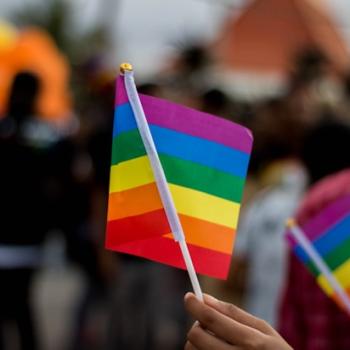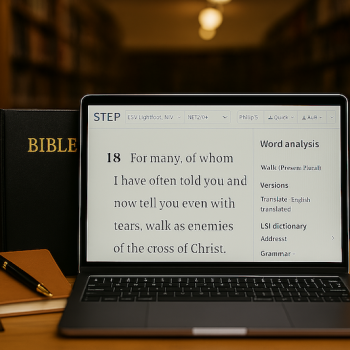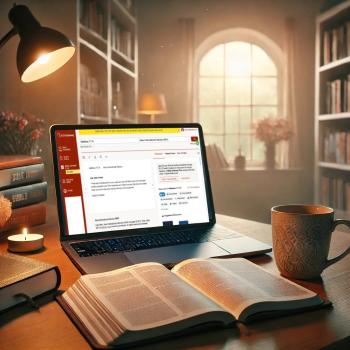Once when holding a child that had died, I prayed for the child, for my wife, and for my own pain. Edmund St John Reynolds was dead and remained dead. Hope and I kept hurting, but prayer worked.
My prayers for my baby boy were answered with a “not yet.” He did not live as I wished him to live, but he will live again on the last day. My prayers for my boy were answered by creating something new in me, reaching down even into my body: a calm in the center of the pain. Hope, without my saying a word to her, sensed the prayers and felt comfort that spread from her soul to her mind to her body.
Prayer worked.
And of course if God is real, then my prayers that the soul of our little baby Edmund would rest in peace were heard. Edmund saw God: born into paradise.

Was this just a placebo effect? I am never sure what this is supposed to mean: placebo effect. If a placebo means that the soul can heal the body in many ways if it only believes, then a placebo is a very powerful idea. Right ideas, immaterial in our minds, can change us so that we become well. This is not nothing, but something. Right prayers to God can put my soul in right order and this is comforting with none of the side effects of drugs.
But can prayer work in the material realm? It will do no good to a hardened skeptic to report that once, as a young boy, I was very sick, the doctor was not sure with what disease, and that my Daddy prayed for me and I felt better immediately. I went from weak and listless to running out of the room and never feeling that weak again. Ever.
Can I prove that I was really sick? What does that mean? I felt horrible and had felt horrible for weeks. Daddy prayed and I felt well and never felt horrible (in that way) again. Maybe the sickness was “just in my head,” but that is a very sketchy phrase. Everything I experience is experienced “just in my head.” Every pain in my body could “just be in my head.” I was sick and then I was well.
I recall my parents feeling led of God to give away our car to a person who lived with us in our house. They told nobody and the person living with us was getting ready to move to a new location . . . with her car! I remember that before our old car was taken away, God led a woman not in our church to give Dad a new car. That never happened to us before that time and it has not happened since, but it happened just when we needed it.
Was it an answer to prayer?
Generally, I am told that “studies” on prayer do not show prayer works. Actually, the data is mixed and there are very few studies. I am warned that my “answered” prayer stories are anecdotes and that a pile of anecdotes is not data.
And yet the difficulty is that the kind of God being studied is not the God in whom I believe. The God of Christianity is a person and as a person can make choices based on His will. Human beings are not the only concern that God has. We may be the apple of God’s eye, but we are not the only beings on whom He keeps an eye. God loves sparrows, polar bears, and whatever is happening around the furthest star. He cares about the entire cosmos and He has a will that will be done in that cosmos.
My prayers are always heard, God loves me, but God does what is best for the entire cosmos and for me in that cosmos. . . not just what is best for me now.
And so the skeptic snorts: “Why pray? God’s plan is fixed!”
This is foolishness. God has a plan, but part of that plan is to allow for us to participate in His plan. Some events in history are unmovable, but God as a designer has allowed some events to be variables in the system. We could have one thing or we could have the other: it is up to us. Sometimes we have not because we ask not.
Imagine a video game. A good game has an overarching story and that story will be told if you continue to play the game. At different points, however, a good game will allow choice: you can kill the orc or save the orc. The story will be different depending on what you do, though many aspects of the outcome will be the same. You cannot change some features of the game, but you can play it in many different ways. Some play games as rogues and others of us as lawful good characters, but the game designer’s will is done.
It is an imperfect image because God loves us and is not “playing” with us but for us. He wants the greatest possible good with the maximum of human liberty within a universe of billions of other concerns. His will is highly complex and no simple study: are you more likely to get what you ask for if your prayer will capture that complexity? The question is more: does prayer help the person who prays? It is obvious it does . . . in fact nobody disputes this. Prayer also correlates nicely with very low probability events every so often. We call these events “miracles” when the personal God does what He can to help us within the plan for the greatest good for all. There is very good evidence for miracles unless you are so close minded that you simply cannot believe in them.
When you pray for a child to get well, the probability is that God will not be whimsical and so the disease will run its course. God encourages humans to explore the rules of the cosmos and do what humans can to avert disease. That too is part of His plan and He will not cut off human growth and learning by doing everything for us. He has set in motion a cosmos that is rule based and He will not stand in the way of events. He measures all the goods, not just the good thing for the moment. And yet God is merciful and a loving heavenly Father and He has allowed us to participate with Him in the good cosmos. He invites us to pray so that He can delight us when He can with an unexpected gift of health, life, or prosperity.
He brings miracles at times, but mostly He helps us spiritually and so prepares us for death. Spiritual help is real help. If die I must, I would rather die in the arms of a loving Father (assuming I can rationally believe in Him) than alone. When my grandparents died hearing the bells of Heaven and seeing Jesus coming to take them home, this was a great good. They could have died with stoic courage, and they were very brave, but it was even better that there death was sweet. We mourned, but not as mourners with no hope. We had to be brave, but at the roots, our courage was the jolly knowledge that our sorrow would someday turn to joy.
When it comes to prayers for health (about the only thing studied), we forget that God wills all of us to die. I will die and this is good. If I did not die, I could not live in eternity. Few wish to die now, our natural doubts assail us, and so we cry out to God. Eventually the answer will be “no.” The time to go will have come and this is hard for those left behind to mourn, but it is better so.
A great deal of my life is “immaterial” . . . if not all the most important parts, at least most of them. Whatever is used to form my thoughts, my thoughts wrestle with ideas and ideas exist immaterially. When I do mathematics, I use numbers and numbers exist apart from matter and energy. In some relationship with my body, there exists a “me” that is not just reducible to my body and that is my soul.
My body will die. This is inevitable, but I need not be afraid of death. Death is not just death of the body: it is a change in me and I am not just my body. Some parts of the body can be replaced and I can continue, but there is not replacing me.
Prayer exists in words and ideas and speaks to the Immaterial One who will preserve my personhood until it can be reunited with my body. No disaster is merely material but rumbles through the metaphysical world causing hurts in the souls of those impacted. My prayers always create changes in that world and are used by a good God to sooth the pain.
This is summed up in the first written prayer I recall:
“Now I lay me down to sleep. I pray Thee Lord my soul to keep. If I should die before I wake, I pray Thee Lord my soul to take.”
Amen

















